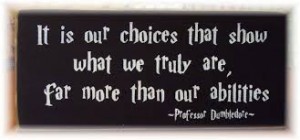Our Choices are Our Power
On the last day of the course that Clayton Christensen teaches at Harvard Business School, he shares some of his life experience and wisdom with his students. He urges them to be careful to not become vulnerable to the forces and decisions that have derailed too many. He leaves his students with some guiding life questions :
How can I be sure that
• I will be successful and happy in my career?
• My relationships with my spouse, my children, and my extended family and close friends become an enduring source of happiness?
• I live a life of integrity—and stay out of jail?

All of these questions have something in common. At the core, they are about making choices. Christensen essentially asks his students to really consider the choices they will be facing throughout their lives. By posing these specific questions, he is urging them to consider their role in choosing their path to their best possible life outcome. It occurs to me that the best way to accomplish this is day-to-day, in the micro-interaction of life that often occur one conversation at a time.

In conversations, each one of our choices can be more powerful than we may ever realize, especially when we are engaging in conflict communication. Interestingly, when we are focusing too much on the content of the conversation, or more precisely our desire to be right or preserve our ego, rather than the relational form of the conversation, which highly influences the outcome of our relationship, we may become shortsighted and unable to see the possibilities that are available. We also have the potential of damaging our relationships in the process. This is exactly the opposite of fostering relationships with spouses, children, and extended family, and close friends of enduring sources of happiness, as Christensen suggests.

Quite simply, when we communicate we make choices (with each micro-interaction), which lead to consequences, and followed by significant outcomes. The relational form refers to the dynamic of the interaction and what it means to our relationship (e.g., active opposition or collaboration in communication). When we communicate with one another, we convey messages that contain both content (e.g., information and affect) and relational instructions (which demand control, relinquish control, or share control of the relationship). Most of the time, while we are in a conversation, we are generally not aware of the relational instructions of our messages. We are to consumed by the content of the communication. If we can “move to the balcony,” or in other words, see above the content and see the relational aspect of the communication, we have much more power in steering the conversation to a better relational outcome. We can choose to move toward the other person rather than away from them, conversationally and relationally.
When we are able to be mindful of our choices, anticipate the consequences, and be strategic about the outcomes, we have more power in our communication. Every time we speak we have the possibility of strengthening our relationships. The opposite is also true.
We can always chose to:
• Forgive
• Collaborate
• Validate
• Turn toward others, not push them away
• Be a master of communication not a disaster
To become a master of communication not a disaster, the first thing to do is to way to do this is to be mindful of our choices, within every communication interaction because our choices truly are our power.




